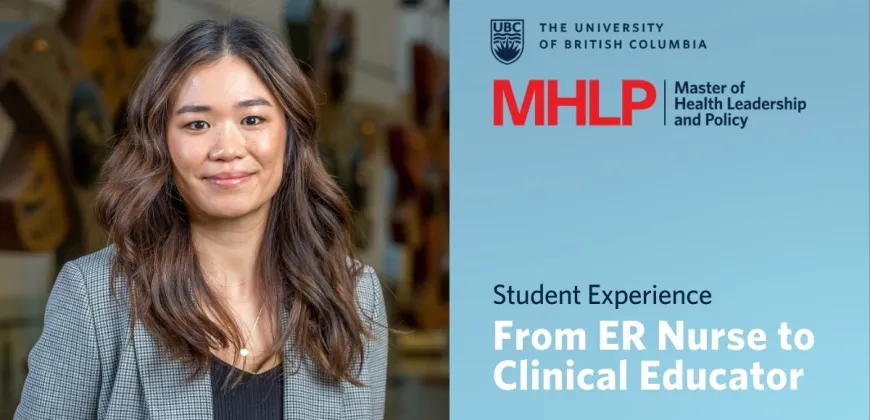Going Beyond the Classroom to Gain New Skills and Increase Employability

For many of us, learning comes by doing. We often make the biggest leaps in our understanding and capabilities when we’re in the midst of a complex project that draws on our experience and knowledge, pushes us out of our comfort zones and requires us to connect with new people.
In the Master of Engineering Leadership (MEL) and Master of Health Leadership and Policy (MHLP), capstones, practicums and project-based coursework are ideal opportunities for students to make the bridge between theory and application while applying their technical and communication skills in a practical real-world context.
Resume-building projects
These projects are tangible opportunities to work with an industry or community partner on a specific challenge. In addition to gaining new skills and building experience in an area that might be completely new to them, students also benefit by growing their professional network and making connections with leaders in their field.
“These can include both team-based projects and individual assignments,” says Clement Yim, Manager of MEL & MHLP Programs. “They draw on students’ technical knowledge as well as business and leadership skills gained through the courses taught through the Sauder School of Business.”
The project-based learning offerings vary from program to program and course to course.
In Clean Energy Engineering, students complete a capstone project that counts as a course credit. In High Performance Buildings, students work in groups on industry-driven projects over two separate courses. In Clinical Education, students complete a practicum with a community partner – which “opens up opportunities for students to connect with industry leaders and apply their skills in a specific area they are passionate about,” according to Program Director Cheryl Segaric.
In addition to these larger course-long projects, many of the sector-specific courses offered in the MEL and MHLP include opportunities for students to connect with an industry or community partner to complete smaller project-based assignments.
“These kinds of projects, based on real-world scenarios, enable students to integrate their learning from and have the added potential benefit of connecting them with mentors in the organization,” says Jessi Guercio, Career Strategist for the MEL and MHLP.
Tangible, practical projects that build experience and grow networks
The list below shows examples of some of the more recent capstones, practicums and final course projects students have worked on:
- In High Performance Buildings, a team of students developed a design for a new elementary school in North Vancouver that they entered in an international design challenge, securing a spot in the final competition.
- Students in Sustainable Process Engineering worked with industry partners to assess the viability of carbon capture technology
- Students in Integrated Water Management collaborated with a consulting firm to assess the feasibility of introducing a new and holistic index for managing urban water systems
- In Urban Systems, students completed an asset management plan for the City of Surrey
- In another project, students in Urban Systems worked with the City of Edmonton to propose design ideas for a sustainable community being built on lands once used for a municipal airport
- Students in Naval Architecture and Marine Engineering worked with a marine classification society to develop a methodology for assessing the risk that a ship could lose propulsion during high waves
- A student in Clinical Education used her practicum to assess the need for a supervised inhalation space at a Vancouver hospital
- In Seniors Care, a student conducted an assessment of the physical and social contributors to health at her place of employment, a senior’s residence in Vancouver
Vladan Prodanovic, Program Director of Clean Energy Engineering, sees incredible value in these kinds of industry-connected projects. “They are an opportunity to go deeper into a particular area than what we can explore in our curriculum,” he says. “Occasionally, that leads to a job offer, which is a best-case scenario”
“Regardless, it enables students to step out of their comfort zones and do interesting relevant work.”
Make connections that can lead to work
Each year, some students are able to directly turn their capstones, practicums or industry-led projects into job offers. This was the case for Ahmed Soltan, a 2022 graduate of the Clinical Education program who did a practicum on infection and control policies and was then offered a job as a policy analyst after graduating. Many students in Clean Energy Engineering have been offered jobs with their capstone partners.
Even if the project does not lead to a job offer with the same industry or community partner, students have found that the projects do provide a stepping stone to future employment.
“Our students are getting first-hand relevant industry experience, which they can highlight on their resumes and in job interviews, and which increases their employability,” says Jessi. “It also boosts confidence when pursuing work with similar organizations.”
Have a plan
“When you’re coming into the program, it’s helpful if you can set clear goals about what you want to achieve,” says Clement. “You can then take a more active approach to choosing projects or tailoring them in ways that will help you grow your skills and contacts.”
MEL and MHLP program staff provide support for that to happen. Guercio organizes a regular series of professional development workshops that touch on networking, goal-setting and other topics. He also offers career coaching which empowers students to reflect on their goals and draw connections between the projects they’ve worked on during their degree and their career plans.
(Read more about unlocking opportunities for networking and career development.)
This was the approach taken by Carlie Owen, a student in Clean Energy Engineering. Carlie took a proactive approach to building her professional network and reached out to individuals active in the province’s clean energy sector to find a capstone project in an industry she wanted to gain experience in.
“Starting in the second semester, I began contacting individuals on LinkedIn to learn more about Vancouver’s clean energy industry,” she explains. “I set up weekly calls with different people, and through that I learned about Regenerative Waste Labs and the work they are doing in bioplastics.”
This was also the approach taken by Jen Muller, a student in Clinical Education. “I knew I wanted to work in the area of substance use, and I knew great things about the addiction medicine and urban health team at Providence Health Care,” she says. “So I reached out to the Clinical Nurse Specialist to find out more about the issues she was facing in her clinical practice and to see if there was an opportunity for me to do my practicum with their team.”
A launchpad for the future
As professional master’s degrees, the MEL and MHLP create opportunities for students to apply their in-class learnings to real-world scenarios.
“Whether it is a smaller project or a full-term capstone project,” says Guercio, “these experiences enable students to increase their learning, gain new skills, work on teams and get first-hand relevant industry experience on what’s happening right at this moment, ultimately increasing their employability.”





